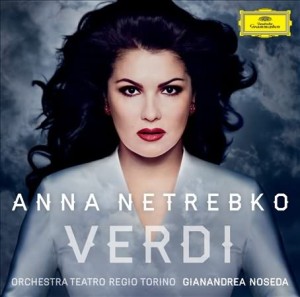I think Anna Netrebko is by now review-proof, and possibly criticism proof: even her warm relationship with and support for Vladimir Putin, despite his attitude toward the lesbian and gay community, has left her unscathed. First the world tolerated her poor diction and lack of a real trill; now her politics. She’s golden. Her charisma is eternal.
It’s been obvious for some time that Netrebko and her voice were headed for heavier territory than the high coloratura roles that she was never really suited for—sloppy scale work, stabs at high Ds, misses on high E-flats—but Lady Macbeth? That’s what opens the program—all three of the Lady’s scenas. The voice cannot be right for this music on stage for a while: her sound is not dense enough in the middle. But on CD size can be overlooked; there are good moments and bad.
In the recit “Nel di della vittoria” she manages the high C on the word “retrocede”, but she walks rather than sails up to it, and the cadenza off it is slovenly and inaccurate. After that it’s a fine performance, with nice dark overtones and a pretty good sense of the words. By contrast, “La luce langue” is better sung but sounds just learned: her concentration is only the notes and rhythm, with no coloring of the very vivid text. The Sleepwalking Scene begins badly, her first two or four words sung flat, but she gets into it shortly thereafter and her fil de voce high D-flat at the end is there, even if it is as tricky as almost everyone else’s. But she is not in the Callas or Verrett league, or even in a less demanding league (Guleghina or Dimitrova), either vocally or dramatically. She will sing the entire opera, live, in June and July of 2014 in Munich; either she will sing it her way, which lacks true command, or do it right and not have much left by 2016.
In the aria from Giovanna d’Arco Netrebko uses a far lighter, more natural tone, and it’s a lovely performance, even if it doesn’t quite sound like someone who is about to try to save France. The great—and very difficult—“Arrigo! Ah, parli un core” from Vespri lacks emphasis on crucial phrases, like “I love you” and “I’m dying,” (it would have taken only a shift in volume to fake either emotion), but the aria is well tuned; she also manages the wicked cadenza from high C to the F-sharp two and a half octaves below relatively well, although you wouldn’t want to depend on the lowest few notes to hold you up if you were sinking. Her performance of the last-act Bolero from the same opera is awkward, and she sounds like a student. Elisabetta’s “Tu che le vanita” requires depth and breadth and she manages three-fourths of each, singing the long aria with an intelligent sense of where the music is supposed to go—but again, Netrebko seems to remain outside the character.
Her Trovatore Leonora, which we hear from the start of the last act through the Miserere and cabaletta, “Tu vedrai”, seems a fine fit, as far as size and temperament go, but she still could have done more. Conductor Gianandrea Noseda gives her a break and takes the aria rather quickly so she can flirt with the trills and dart up to and off the high, quiet B-flats. As elsewhere, and I fear I have not mentioned this before, the voice, the sound, the aura, are radiant.
The Miserere is a dreadful moment for this character—she’s at her most mortally depressed, which you can hear from Callas, Price, or even Milanov on the words “Sento mancarmi”, in the desperation with which they infuse the tone. But Netrebko does not move the listener, despite Rolando Villazon’s unhappy utterances “from a tower” that are recorded too closely. “Tu vedrai” is fluent and exciting but not sung with any sense of fist-shaking: Leonora , in a moment of strength regained, is announcing that her love will win over death. Pretty strong stuff—but not here. And Noseda is no help, refusing to punch up the music at any point.
With all that criticism—and please understand that I really am a great fan of Netrebko’s—the voice and artistry remain above most of the competition. But couldn’t she have waited another year, after she had sung these roles on stage so that she actually walked in the shoes of these women (so to speak)? I don’t expect her to have Callas’ or Scotto’s almost painful insights, but it would be wonderful if she intellectualized some of her work. You listen to a soprano like Karita Mattila or Sondra Radvanovsky and you sense the study, the desire to know what this is all about and to communicate it at its deepest level. Does Netrebko really want to be just the plat du jour, year after year, never achieving the brilliance of her promise? The image of her on the CD cover has been photo-shopped enough to look like a tougher, more formidable version of herself—and you wonder what that implies about her approach to the music. Mmmm—an interesting case.
































